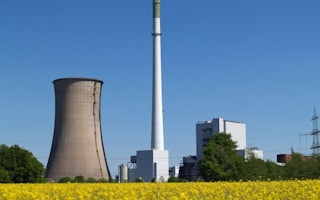Global carbon dioxide emissions may rise by seven per cent by 2035 should the Fukushima nuclear disaster slow the pace of expansion in atomic power generation, a Japanese study said.
Greenhouse gas emissions may increase by 2 billion metric tons annually by 2035 if fossil fuels substitute any reductions in planned output from atomic reactors, the Institute of Energy Economy, Japan said in its Asia/World Energy Outlook 2011, which was released this week.
The report predicts there will be a slowdown in the expansion of nuclear power outside Asian countries such as China and India after the catastrophe at the Fukushima Dai-Ichi nuclear plant north of Tokyo, the worst civil atomic disaster since Chernobyl in 1986.
The report from the government-run institute estimates global nuclear power generation will expand by 110 gigawatts from 2010 to 500 gigawatts by 2035, according to the institute. Before the Fukushima crisis, atomic power was expected to increase to 574 gigawatts.
Should all nuclear stations be closed and fossil fuels used instead, another 2 billion tons of carbon dioxide will be released by 2035, according to the report.
Tokyo Electric Power Co.’s Fukushima plant has been discharging radiation since the March 11 earthquake and tsunami knocked out cooling systems, causing three meltdowns and explosions. The catastrophe forced 160,000 people to flee radiation and damaged fishing, farming and forestry businesses.










